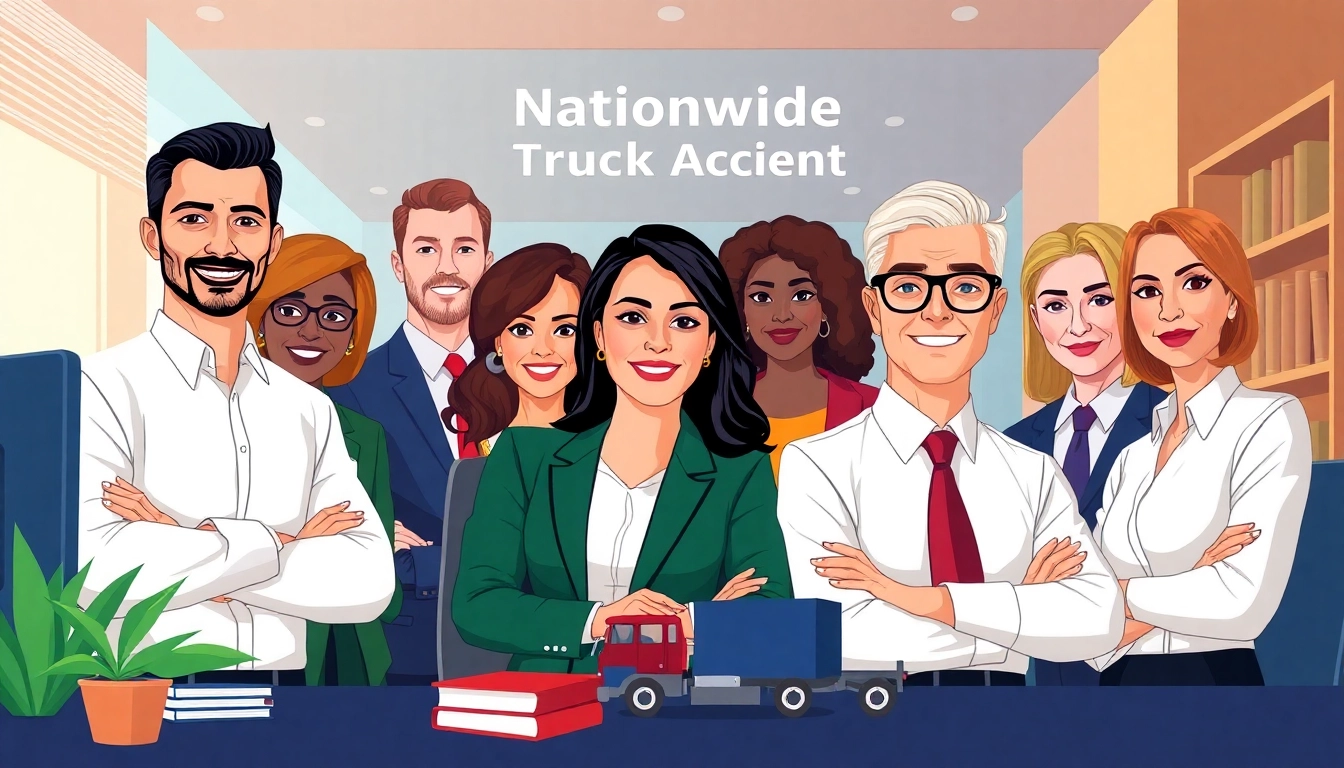Understanding Truck Accident Claims and Your Rights
Truck accidents can have devastating effects on victims and their families, resulting in serious injuries, financial burdens, and emotional distress. Understanding the complexities of truck accident claims is crucial for anyone affected by such incidents. Proper guidance from Nationwide Truck Accident Attorneys can significantly improve your chances of securing fair compensation.
What Constitutes a Truck Accident?
A truck accident typically involves a commercial vehicle, such as a semi-truck or delivery truck, that collides with another vehicle, pedestrian, or object. Different types of truck accidents include:
- Rear-end collisions: Often caused by tailgating, poor visibility, or distracted driving.
- Side-impact collisions: Often termed ‘T-bone’ accidents, these frequently occur at intersections.
- Rollover accidents: Usually due to sharp turns or excessive speed, particularly in trucks with high centers of gravity.
- Jackknife accidents: Occur when the trailer swings away from the cab of the truck, often caused by sudden braking.
- Load shifts: Dangerous situations can arise when cargo is improperly secured, leading to accidents.
Identifying the type of truck accident is essential for establishing liability and guiding the claims process.
Your Rights After a Nationwide Truck Accident
After a truck accident, victims have specific rights aiming to protect them from financial losses and ensure access to necessary medical care. Some key rights include:
- The right to seek compensation: Victims can claim damages for medical expenses, lost wages, pain and suffering, and property damage.
- The right to pursue legal action: If insurance claims do not cover losses adequately, victims can file lawsuits against liable parties.
- The right to maintain privacy: Victims have the right to confidentiality regarding their medical and personal information.
- The right to refuse settlement offers: Victims can decline initial settlements that they believe do not reflect their losses.
Understanding these rights is crucial for navigating the aftermath of a truck accident.
Common Challenges in Truck Accident Cases
Truck accident cases present unique challenges, including:
- Liability complexities: Determining who is responsible in truck accidents can be complicated, as multiple parties (drivers, trucking companies, manufacturers, and maintenance providers) may share liability.
- Regulatory factors: Trucking companies must adhere to federal and state regulations, which can add layers of complexity to claims.
- Insurance play: Trucking companies often have more substantial insurance coverage, which affects negotiations and settlement offers.
- State laws: Different states have varying laws regarding truck accidents, impacting how claims are handled.
These challenges underscore the importance of hiring experienced nationwide truck accident attorneys who can navigate the legal landscape effectively.
Choosing the Right Nationwide Truck Accident Attorneys
Selecting the right attorney to represent you can have a profound impact on your case. Their expertise and strategy can greatly influence the outcome.
Qualities to Look for in Your Attorney
When evaluating potential attorneys, consider the following qualities:
- Experience in Truck Accident Cases: Look for attorneys who specialize in truck accident cases and have a track record of success.
- Communication Skills: Your attorney should be approachable and be able to explain complex legal concepts in understandable terms.
- Negotiation Skills: Effective negotiation techniques are vital for securing the best possible settlement.
- Trial Experience: Ensure your attorney has experience in court and is prepared to take your case to trial if necessary.
- Client-Focused Approach: A good attorney prioritizes clients’ best interests, providing personalized attention throughout the legal process.
How Experience Impacts Case Outcomes
Experience matters when it comes to handling truck accident claims. An attorney with years of experience will have a deep understanding of:
- The legal landscape: Knowledge of state and federal trucking regulations is crucial for building a strong case.
- Insurance company tactics: Experienced attorneys are familiar with common strategies employed by insurance companies to minimize payouts.
- Expert witness connections: Many successful truck accident claims require expert testimony, and established attorneys often have a network of professionals to call upon.
- Settlement strategies: An experienced attorney knows the ins and outs of negotiation, maximizing your potential compensation.
Questions to Ask During Your Consultation
Your initial consultation is an opportunity to gauge whether an attorney is the right fit for your case. Consider asking the following:
- What is your experience handling truck accident cases?
- What is your approach to handling my case?
- How will you keep me informed throughout the process?
- What are your fees and costs associated with the case?
- Can you provide references from past clients?
These questions can help you assess the attorney’s competency and compatibility with your needs.
Filing a Truck Accident Claim: Step-by-Step Guide
Filing a truck accident claim can be a daunting task, but a structured approach can make it manageable.
Documenting the Accident Scene
Following an accident, it is crucial to collect relevant documentation:
- Taking photographs: Capture images of the accident scene, vehicle damages, and any visible injuries.
- Collecting witness statements: Secure contact information from witnesses to corroborate your account.
- Police report: Request a copy of the police report, which can be substantial evidence in your case.
Documenting the scene thoroughly can play a vital role in establishing liability.
Gathering Evidence for Your Case
Robust evidence is the cornerstone of a successful claim:
- Medical records: Keep records of all medical treatment related to the accident, including diagnoses and treatment plans.
- Truck maintenance logs: These can indicate whether the truck was properly maintained, which may affect company liability.
- Driver logs: Review hours of service logs to determine if the driver adhered to regulations.
- Expert opinions: Consult experts who can assess accident reconstruction and other technical aspects of the case.
Having comprehensive evidence strengthens your case and supports your claims for damages.
Understanding Insurance Policies and Compensation
Trucking companies typically carry more substantial insurance coverage due to the nature of their operations. Understanding how these policies work is key:
- Liability coverage: This covers damages caused by the truck driver if they are found liable.
- Uninsured/underinsured motorist coverage: This protects you if the at-fault party lacks sufficient insurance.
- Comparative negligence: If you are found partially at fault, your compensation may be reduced based on your percentage of fault.
- Punitive damages: In some cases, if the trucking company engaged in gross negligence, additional punitive damages may be pursued.
Understanding these factors will help you better prepare your case for negotiation and potential litigation.
Negotiating Settlements with Insurance Companies
Negotiating with insurance companies is often one of the most critical aspects of a truck accident claim.
How Truck Accident Cases Differ in Settlements
Truck accident settlements differ from standard car accident settlements due to various factors:
- Higher stakes: The severity of injuries in truck accidents often leads to larger claims.
- Multiple liable parties: More parties can complicate negotiations, as insurers may pass the blame between themselves.
- Insurance coverage limits: Understanding the limits of coverage can directly influence your negotiation strategy.
Negotiation Strategies for Better Outcomes
Successful negotiations require preparation and strategy:
- Document everything: Supporting evidence strengthens your position in negotiations.
- Be patient: Avoid rushing the negotiation process; take time to evaluate offers and consult your attorney.
- Know your worth: Be aware of average settlements for similar cases to back your demands.
- Counter-offer: If an initial offer seems low, make a counter-offer supported by evidence.
When to Accept or Reject an Insurance Offer
Deciding whether to accept or reject an insurance offer requires careful consideration:
- Evaluate your needs: Assess current and future medical expenses, lost wages, and personal damages before deciding.
- Consult your attorney: Seek advice on whether the offer aligns with your case’s value.
- Understand the offer: Make sure you comprehend what the offer covers and any potential ramifications of acceptance.
Making an informed decision can save you from regrettable choices later on.
Preparing for Trial: What You Need to Know
Should your case proceed to trial, preparation is key to a successful outcome.
The Role of Nationwide Truck Accident Attorneys in Court
Your attorney plays a crucial role during the trial:
- Case strategy: Your attorney develops a thorough strategy tailored to your case, which will be presented to the court.
- Evidence presentation: They will present collected evidence persuasively to support your claims.
- Witness examination: An experienced attorney knows how to effectively examine and cross-examine witnesses.
- Legal arguments: Your attorney will outline the legal basis for your case, persuading the judge and jury.
Understanding the Trial Process
The trial process typically includes:
- Jury selection: Selecting jurors who are unbiased and can fairly assess the case.
- Opening statements: Both sides present their case outlines to establish the context for the jury.
- Witness testimonies: Witnesses provide testimonies, providing crucial insights and context for the accident.
- Closing arguments: Each side summarizes their positions and argues their case one final time before jury deliberation.
- Verdict: After deliberation, the jury will deliver a verdict determining liability and damages.
Possible Outcomes and Appeal Options
The potential outcomes of a truck accident trial include:
- Favorable verdict: If you win, the jury will award compensatory damages.
- Unfavorable verdict: If you lose, you might not receive any compensation, depending on the circumstances.
- Appeal options: If you lose or are unsatisfied with the verdict, you may have grounds for appeal based on procedural errors or misinterpretations of law.
Understanding these outcomes can help you prepare both legally and emotionally for the trial process.




